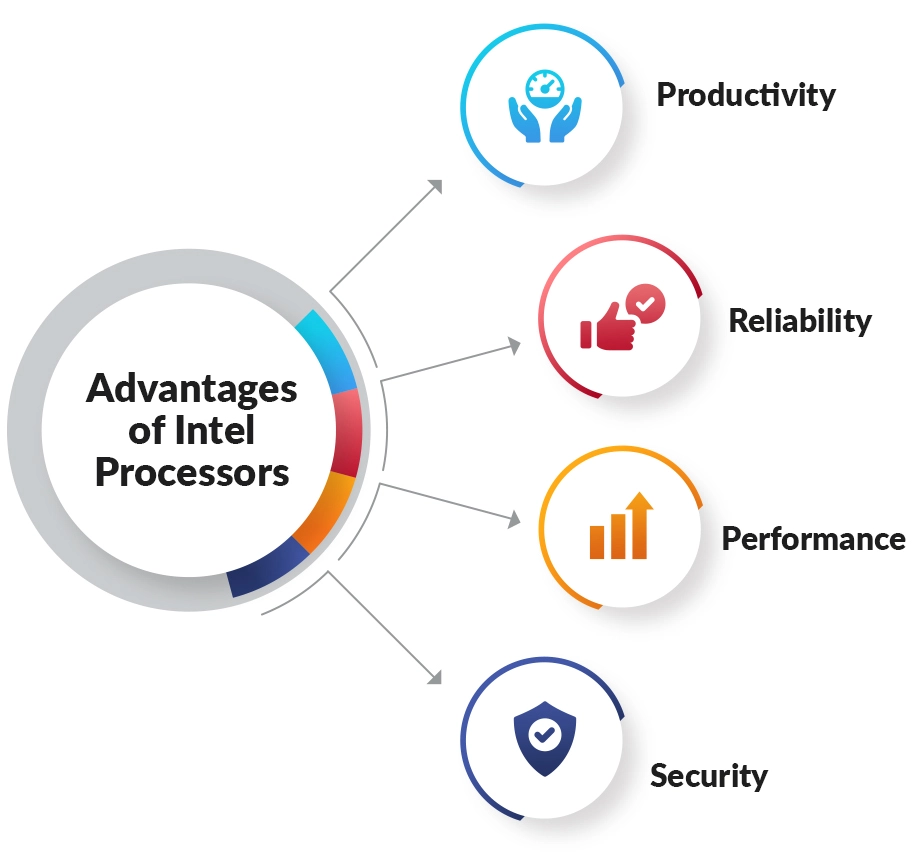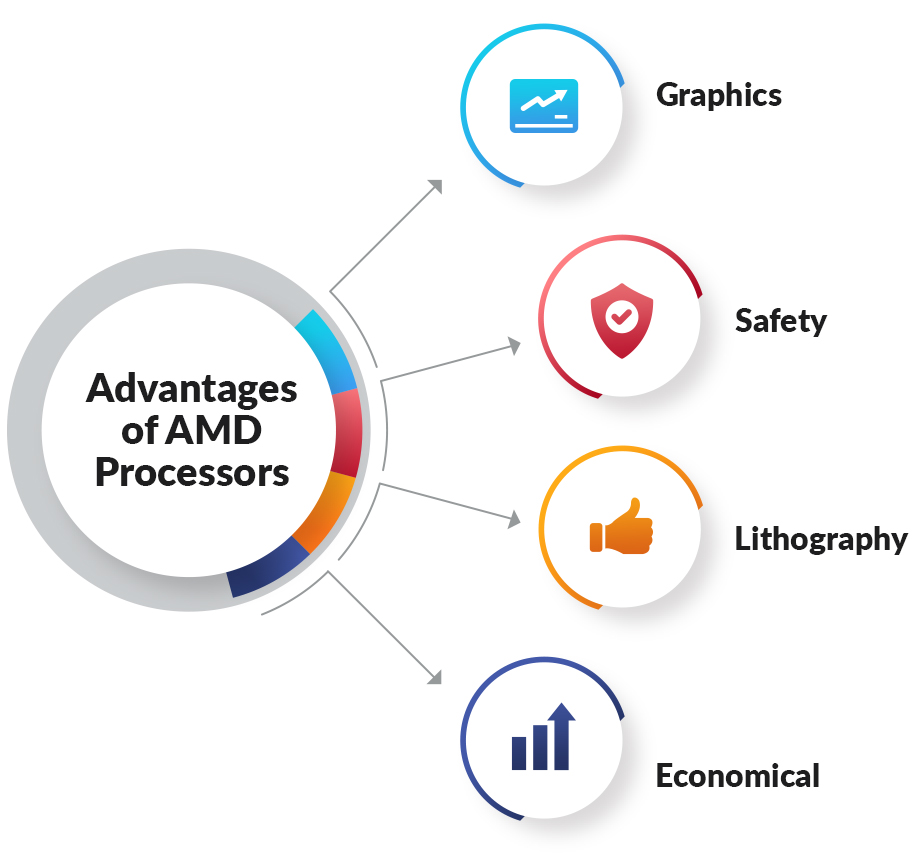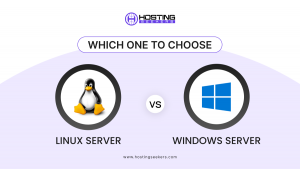
AMD vs Intel (2026): The Right CPU for Gaming, Creation & Laptops
Comparison Updated on : January 8, 2026When it comes to upgrading or buying a new PC, choosing between AMD and Intel is where most of us get stuck. This blog covers the never-ending argument on AMD vs Intel to help you make an informed decision.
Intel and AMD are the world’s highest-valued semiconductor chip makers based on revenue. Both Intel and AMD are found in most laptops and computers today. Hence, you might have observed these words written on your laptop.
While the suitability of these processors depends on the users’ needs and preferences, Intel and AMD are equally well-known and reliable brands. As these processors are not interchangeable, you need to understand the terms and their features in detail.
AMD vs Intel CPU: Market Share
Over the past decade, the CPU market has seen significant shifts. Intel maintained a strong lead from 2012 to 2018, but AMD’s Ryzen lineup (launched in 2017) steadily increased its share, peaking around 2021–2023. Although Intel still dominates the client CPU segment, AMD continues to hold a solid quarter of the market going into 2026.
AMD vs Intel Market Share by Year
| Year | AMD (%) | Intel (%) |
| 2012 | 13.75 | 86.25 |
| 2013 | 12.00 | 88.00 |
| 2014 | 11.00 | 89.00 |
| 2015 | 12.00 | 88.00 |
| 2016 | 11.25 | 88.75 |
| 2017 | 13.00 | 87.00 |
| 2018 | 13.50 | 86.50 |
| 2019 | 14.00 | 86.00 |
| 2020 | 16.00 | 84.00 |
| 2021 | 25.00 | 75.00 |
| 2022 | 29.00 | 71.00 |
| 2023 | 29.50 | 70.50 |
| 2024 | 24.00 | 76.00 |
| 2025 | 24.30 | 75.50 |
AMD vs Intel Market Share 2025 (Q1 & Q2)
| Quarter | AMD Market Share | Intel Market Share |
| Q1 2025 | 24.7% | 75.3% |
| Q2 2025 | 23.9% | 76.1% |
| Average (Q1 + Q2) | 24.3% | 75.7% |
Understanding AMD In-Depth – What Exactly Does AMD Stand For?
AMD stands for Advanced Micro Devices and is a California company. AMD supplies server processors, workstation processors, embedded and semi-custom processors, laptop processors, desktop processors, and Chromebook processors. Ryzen is the most popular brand for AMD processors. AMD is known to have the world’s highest-performing x8 processors.
Here are the main advantages of using AMD processors:
- Graphics
- Safety
- Lithography
- Economica

1. Productivity: They provide remarkable performance for great productivity and entertainment at the same time.
2. Reliability: They are reliable across a lot of different platforms and service requirements as well.
3. Performance: They support demanding applications with high performance.
4. Security: They are enhanced with high-security features.
Intel has a broad range of processors for laptops, desktops, workstations, and server management. They have processors to fit the buyer’s needs. These work well for personal and business uses, including gaming, content creation, IoT, and artificial intelligence. The most popular CPUs are the Intel Core processors that target mid-range customers.
Understanding AMD In-Depth – What Exactly Does AMD Stand For?
AMD stands for Advanced Micro Devices and is a California company. AMD supplies server processors, workstation processors, embedded and semi-custom processors, laptop processors, desktop processors, and Chromebook processors. Ryzen is the most popular brand for AMD processors. AMD is known to have the world’s highest-performing x8 processors.
Here are the main advantages of using AMD processors:
- Graphics
- Safety
- Lithography
- Economical

1. Graphics: AMD provides extraordinary graphics processors that are suitable for gaming specifically.
2. Safety: AMD can detect malware with its Enhanced Virus Protection feature.
3. Lithography: AMD has a smaller lithography that does not cause the machine to heat up too often.
4. Economical: AMD targets groups of users who have lower budgets.
Offering a wide range of processors, AMD is a popular choice for buyers with a budget constraint, requiring high graphic quality and efficiency. It is also a reliable choice similar to its main competitor and is, therefore, preferred by users focusing on graphics and curbing expenses.
AMD vs Intel: 7 Major Differences Between Intel and AMD
Intel vs AMD has been a debate between content creators, PC gamers, and PC builders for a long time now. Intel and AMD are the top competitors in the CPU market, be it for workstations or for gaming. Comparing devices like laptops is difficult today since they are identical except for the CPU. Different factors like budget and specific requirements affect the choice that the buyer makes, since the layout and infrastructure are completely different for both.
Here are some of the significant differences between Intel and AMD processors:
1. Processors
The AMD and Intel Processor debate is intense when it comes to the efficiency of processors. This depends on the kind of buyer buying these processors. Intel processors are slightly more expensive than AMD processors. If a buyer is opting for a budget laptop, AMD processors might be a better choice. When it comes to power, AMD consumes more power than Intel processors. However, for a high-end laptop, an Intel-based processor might be a wiser choice since the compatibility is better and proves to be more advantageous.
2. Performance
AMD and Intel CPUs offer performance that is very similar to each other. However, each of these specializes in specific things and also targets different sections of users. For example, AMD processors are known for better results in multitasking. This is one reason they are recommended for those who do not want to shell out too much money on laptops. Intel CPUs, on the other hand, are best for single-core tasks. They are faster but might be more expensive.
However, AMD CPUs tend to offer better value for money. While comparing AMD vs Intel gaming, a low-end segment laptop with an AMD processor also might give good results. However, users believe that Intel offers better performance for a higher price, but AMD is a more reasonable option for a processor. For audio-video production or sound editing, Intel-based machines prove to give better outcomes.
3. Price
AMD has successfully been able to provide cheaper alternatives to CPUs in the last few years. Comparing AMD’s Ryzen 3 with Intel’s Core i3 processor, the former ranges between $95 and $120, while the latter ranges between $97 and $160. The lower price offered by AMD is one of the reasons why everyday users have started shifting to AMD from Intel in the last few years.
4. Market Share
Although Intel is an older company than AMD, AMD has significantly changed the distribution of the market share in recent years. According to HardwareTimes, Intel was at 75.40% market share while AMD was at 24.60% market share in 2021. There was a change in these statistics when Apple changed its processors from Intel to Apple Silicon. However, the majority of the market share still remains with Intel today.
5. Security
Those who know the industry well have always been worried about the vulnerabilities of processors that might ultimately harm the users. However, there has been no clear conclusion to the Intel or AMD debate when it comes to security. Both vendors regularly disclose and patch vulnerabilities. Raw CVE counts aren’t a meaningful ‘which is safer’ metric; evaluate security features and firmware/BIOS update cadence per platform.
6. Products
Intel’s product line comprises microprocessors and motherboards, while AMD’s product line includes microprocessors, servers, and motherboards. Even though both have a variety of products, their processors are best known.
7. Customer Support
Both Intel and AMD have dedicated web pages to support their customers. Comparatively, Intel has a stronger community presence online. They have a detailed blog and interactive customer support. Intel also offers its customers round-the-clock phone and chat support. AMD allows its users to check details of their products, for example, the warranty. They also have a detailed page with frequently asked questions to help their users.
These are the set of differences that might help a user decide on the priority features and then go ahead with either one of the two. We recommend understanding your needs and then reading the above points to see which option fulfills most of your needs before making a choice.
What is the latest Intel processor
| Processor Name | Launch Date | Total Cores (or Cache spec) | Max Turbo / Max Frequency | GPU / Graphics |
| Intel® Core™ i5‑110 Processor (12M Cache, up to 4.30 GHz) | Q3’25 | 6 cores | up to 4.30 GHz | Intel® UHD Graphics 630 |
| Intel® Core™ 9 processor 270H | Q4’24 | 14 cores | up to 5.80 GHz | Intel® Graphics |
| Intel® Core™ 7 Processor 251TE (36M Cache, up to 5.40 GHz) | Q1’25 | 24 cores | up to 5.40 GHz | Intel® UHD Graphics 730 |
| Intel® Core™ 7 Processor 251E (36M Cache, up to 5.60 GHz) | Q1’25 | 24 cores | up to 5.60 GHz | Intel® UHD Graphics 730 |
| Intel® Core™ 7 processor 250U (12M Cache, up to 5.40 GHz) | Q1’25 | 10 cores | up to 5.40 GHz | Intel® Graphics |
(Source: https://www.intel.com/content/www/us/en/products/details/processors/core.html)
Latest AMD Processor
| Processor Name | Cores / Threads | Boost / Base Frequency | Total Cache (L3) | SEP (USD) |
| AMD Ryzen Threadripper 9980X | 64 / 128 | up to 5.4 GHz / 3.2 GHz | 256 MB | $4,999 |
| AMD Ryzen Threadripper 9970X | 32 / 64 | up to 5.4 GHz / 4.0 GHz | 128 MB | $2,499 |
| AMD Ryzen Threadripper 9960X | 24 / 48 | up to 5.4 GHz / 4.2 GHz | 128 MB | $1,499 |
(Source: https://www.amd.com/en/blogs/2025/designed-to-create-built-to-inspire-amd-introduces-new.html)
AMD vs Intel Processor Comparison Chart
| Processor Name | Cores / Threads | Max Turbo / Frequency | Cache / GPU | Price (USD) |
| Intel® Core™ i5‑110 | 6 / 12 | 4.30 GHz | 12 MB / Intel® UHD Graphics 630 | $200 |
| Intel® Core™ 9 270H | 14 / 28 | 5.80 GHz | – / Intel® Graphics | $384 |
| Intel® Core™ 7 251TE | 24 / 48 | 5.40 GHz | 36 MB / Intel® UHD Graphics 730 | – |
| Intel® Core™ 7 251E | 24 / 48 | 5.60 GHz | 36 MB / Intel® UHD Graphics 730 | – |
| Intel® Core™ 7 250U | 10 / 20 | 5.40 GHz | 12 MB / Intel® Graphics | – |
| AMD Ryzen Threadripper 9980X | 64 / 128 | 5.4 GHz | 256 MB / None | $4,999 |
| AMD Ryzen Threadripper 9970X | 32 / 64 | 5.4 GHz | 128 MB / None | $2,499 |
| AMD Ryzen Threadripper 9960X | 24 / 48 | 5.4 GHz | 128 MB / None | $1,499 |
AMD vs Intel: Which CPU is the best?
The AMD vs Intel CPU tug-of-war is mostly undecided due to the various CPU models and variants available for each manufacturer.
However, you can make the appropriate decision by focusing mainly on CPUs within your price range that provide the best performance for your use case. Utilizing factors like support, power efficiency, stability, and security can also help you to prefer your choices.
AMD vs Intel for Gaming
Intel CPUs mostly provide good performance and value for games as compared to AMD processors. When analyzing and evaluating complex AI in a video game, you require higher instructions-per-clock (IPC) and single-thread clock speed; these are the factors where Intel shines. AMD chips’ core architecture is mostly more suitable for multitasking workloads compared to high-performance gaming.
When you think of gaming, usually what may come to mind are GPUs or Graphics Processing units and increasing GPU performance.
Moreover, gaming is actually among the most CPU-taxing activities. Some games can easily stress your CPU and raise its temperature. Also, a good way to observe if your computer can manage and handle gaming at a high load for an extended time is with a CPU stress test.
Best Intel CPU for gaming(2026)
- Intel Core i9‑14900K — Flagship Gaming Power
- Intel Core i5‑14600K — Balanced Gaming + Value
- Intel Core i5‑12400F — Budget‑Friendly Gaming Workhorse
Best AMD laptop CPU for gaming (2026)
- AMD Ryzen 9 7945HX
- AMD Ryzen 9 7845HX
- AMD Ryzen 7 7745HX
- AMD Ryzen 7 vs Intel i7 – overall comparison table
AMD Ryzen 7 vs Intel i7 – overall comparison table
| CPU Model | Cores / Threads | Base / Boost (or Max Turbo) | Cache / Other Key Spec | Notes — when / why “latest/current.” |
| AMD Ryzen 7 7800X3D | 8 / 16 | ~4.2 GHz / up to ~5.0 GHz | L3 cache ~ 96 MB (via 3D V‑Cache) | Among top current‑gen desktop Ryzen 7 chips (AM5 platform, Zen 4 + 3D‑cache), excellent for gaming. |
| AMD Ryzen 7 7700X | 8 / 16 | ~4.5 GHz base / up to ~5.4 GHz boost | Uses Zen 4 architecture, modern 5 nm process | A strong all‑rounder Ryzen 7, good for gaming + productivity, often compared with Intel i7‑14700K. |
| Intel Core i7-14700K | 20 (8P + 12E) / 28 threads | Base 3.4 GHz / Max Turbo up to 5.6 GHz | 33 MB Intel Smart Cache + 28 MB L2 cache | One of the latest 14th‑gen i7 desktop CPUs (Raptor Lake Refresh). Excellent single‑core and multi‑core performance — strong for gaming and productivity. |
| Intel Core i7-14700 (non‑K) | 20 cores / 28 threads | Base 2.1 GHz / Turbo up to 5.4 GHz | 33 MB Smart Cache + 28 MB L2 cache | A slightly more budget/efficient variant of i7‑14700K — useful if you want i7 power without K‑series premium or overclocking. |
Why choose Ryzen processors?
Choose Ryzen because: –
Ryzen processors offer excellent performance at competitive prices.
Ryzen’s strong multi-core performance makes it ideal for demanding creative workloads.
Ryzen processors can handle multiple tasks simultaneously without a noticeable performance hit.
Why choose Intel processors?
Choose Intel because: –
Intel Core i7 processors often provide a slight edge in gaming performance.
Intel’s platform offers mature overclocking capabilities and a wide range of high-end components.
Intel processors typically excel in single-threaded workloads.
Which is better, Intel or Ryzen, for programming?
For programming, both Intel and Ryzen are excellent choices. Both have their own strengths and weaknesses. To choose the right processors, consider these few points:
Programming Workload: If your work involves heavy multi-threading (like compiling large projects or running multiple virtual machines), Ryzen might be a better choice.
Budget: Ryzen is generally less expensive than Intel.
Personal Preference: Some programmers may prefer the Intel ecosystem or its specific features.
Conclusion
Both Intel and AMD have been dictating the processor world today. Some AMD and Intel differences make each one of these special and more suitable for a certain group of users. However, the user has to determine the budget, requirements, and different activities. According to these factors, the user can then easily decide which is better in AMD or Intel.
This is an important choice that can decide the working style of a user for a few years, especially since these cannot be replaced or changed once used. While Intel has been leading with a majority of the market share since its inception, it has had continued support from its loyal customers. However, it is predicted by experts that AMD will steal a significant part of it and give Intel more intense competition in the coming years.
Frequently Asked Questions
Q 1. Are Intel and AMD the same for laptops?
Ans. The choice of an AMD vs Intel laptop depends completely on the user of the laptop. If the user is choosing a high-end laptop and expects faster and better performance at a higher rate, then Intel might be a good choice. If the user does not want to spend too much money on the laptop and its processor, AMD gives great value for money at affordable prices.
Q 2. Which processor is better for gaming?
Ans. When it comes to AMD or Intel for gaming, experts in the industry tend to trust Intel more than AMD. Speed and graphics are two main components that users generally look for in a good gaming processor. Intel beats AMD when it comes to speed, but AMD offers better integrated graphics performance.
Q 3. What is Ryzen?
Ans. Ryzen is the most popular brand of microprocessors designed by AMD. AMD’s first‑generation Ryzen launched in 2017 and has a range of both CPUs and APUs. There are different versions of Ryzen: Ryzen, Ryzen Pro, and Ryzen Mobile. Ryzen has a smaller transistor, fewer shared resources, and an improved intra-processor link.
Q 4. Why is AMD cheaper than Intel?
Ans. In the pricing difference between AMD and Intel, AMD is significantly cheaper than Intel when it comes to microprocessor chips and CPUs. Experts say that Intel is more expensive because of its brand name. However, there are also talks about both AMD and Intel specializing in different features and targeting different groups of users.
Q 5. AMD vs Intel – Which is more durable?
Ans. CPUs, in general, are considered to be the most durable part of a device. Some professionals believe that Intel and AMD are equally durable. However, AMD users generally see more issues because they tend to use the processor more and at a faster speed than usual. Intel, on the other hand, limits this kind of overclocking. This is a reason most people also believe that Intel is more durable than AMD.
Q 6. Is AMD faster than Intel?
Ans. No, Intel is often faster in single-threaded tasks than AMD. Intel is said to be much faster than AMD, but only after a specific point. If a user only considers everyday activities, then both AMD and Intel offer the same speed. However, if a user uses AMD CPUs more than they should, there can be a case of overclocking.
Q 7. Are AMD laptops good for gaming?
Ans. Yes, AMD laptops are excellent for gaming. With processors like the Ryzen 7 7845HX or Ryzen 9 7945HX, AMD laptops can handle AAA games smoothly. The addition of Radeon GPUs in some models also enhances performance for gamers
Q 8. Which is better for gaming laptops, Intel or AMD?
Ans. Both Intel and AMD offer excellent CPUs for gaming laptops, but the choice depends on specific needs:
- Intel Gaming Laptops: Known for their strong single-core performance and high clock speeds, Intel CPUs like the Core i7-13700H or Core i9-13900HX are ideal for gaming laptops. They often pair well with high-refresh-rate displays and powerful GPUs.
- AMD Gaming Laptops: AMD excels with efficiency and multi-threaded performance, especially with models like the Ryzen 9 7945HX. AMD laptops are often more budget-friendly and deliver great gaming performance with better battery life.
Q 9. Which CPU is better for video editing – Ryzen or Intel?
Ans. Ryzen 7 processors often excel in video editing due to their typically higher core counts and superior multi-core performance.
| Feature | Intel | AMD |
| Performance | Market leader | Competitive performance |
| Multitasking | Good rating | Excels in multitasking |
| Overclocking | Limited capabilities | Strong support for overclocking |
| Integrated Graphics | Intel UHD graphics | Radeon Vega graphics |
| Futureproofing | Established technologies | Focus on constant innovation |
| Gaming Performance | High gaming performance | Significant improvements |
| Compatibility | Specific hardware configurations | Wide system compatibility |
Q 10. AMD Ryzen 5 5600X Reviews
Ans. The AMD Ryzen 5 5600X is well-reviewed for its strong performance in gaming and productivity tasks. It offers excellent value for money, making it a popular choice among budget-conscious users.
Q11. Which is More Costly, AMD or Intel?
Ans. Generally, Intel processors tend to be more expensive than AMD processors. AMD has successfully provided cheaper alternatives, making it a more budget-friendly option for many users.
Q 12. Intel and AMD Processors Prices
Ans. Prices vary based on the specific models and their features. For example, AMD Ryzen 7 processors are typically priced lower than Intel Core i7 processors, providing a more economical choice for users.
Q 13. Best CPU for Gaming in 2026
Ans. Best Gaming CPUs are:
Intel
- Core Ultra 9 285K (Desktop, Arrow Lake‑S) – Modern flagship desktop CPU, excellent for high-FPS gaming and multitasking.
- Core Ultra 9 185H (Mobile) – High-end laptop CPU with integrated Arc GPU and NPU, suitable for portable gaming and creative workloads.
AMD
- Desktop (Zen 5 / Ryzen 9000 Series):
- Ryzen 9 9950X – Top-tier performance, ideal for gaming + streaming.
- Ryzen 9 9900X – High-end, slightly lower price, strong gaming performance.
- Ryzen 7 9700X – Mid-high range, great FPS, and value.
- Ryzen 5 9600X – Budget-friendly, strong gaming performance for 1080p/1440p.
HEDT / Workstation (Zen 5 / Threadripper 9000 Series):
- Threadripper 9980X – 64 cores, workstation-level, overkill for gaming but excellent for multi-threaded workloads.
- Threadripper 9970X – 32 cores, high-end content creation + gaming support.
- Threadripper 9960X – 24 cores, suitable for heavy multitasking and workstation tasks.




